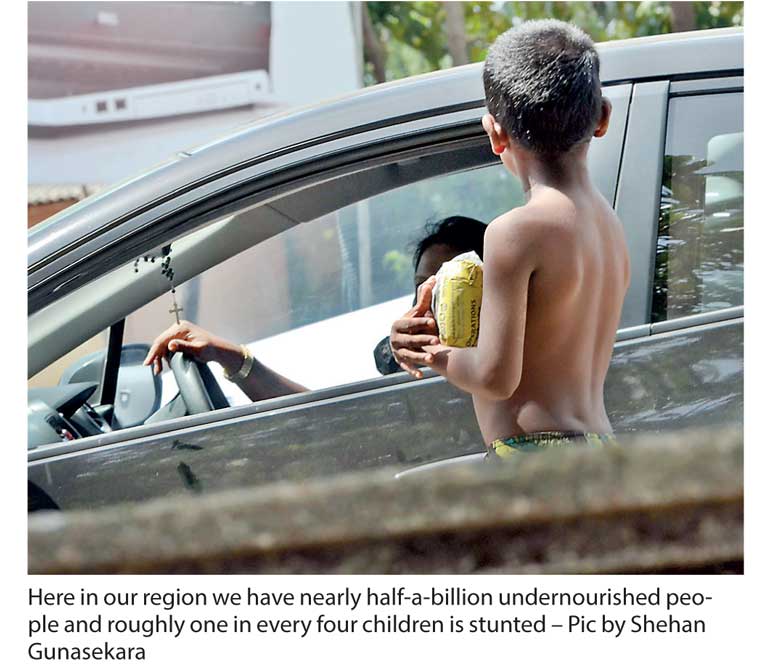Thursday Feb 19, 2026
Thursday Feb 19, 2026
Friday, 10 November 2017 00:00 - - {{hitsCtrl.values.hits}}
 We all know that maintaining a balanced diet is important for our well-being. After all, getting enough nutrients is what keeps us healthy and active. However, as we also know, many people are not eating the right foods.
We all know that maintaining a balanced diet is important for our well-being. After all, getting enough nutrients is what keeps us healthy and active. However, as we also know, many people are not eating the right foods.
For many, it’s simply a decision to stick with foods they enjoy, but aren’t too healthy. This is leading to an increase in non-communicable diseases such as heart attacks, strokes, cancer and diabetes. In turn, this leads to major burdens on our health care systems that have the potential to derail the economic progress that is essential for the poor to improve their lives.
For others, it’s about limited access to nutritious foods or simply a lack of affordability, leading to monotonous diets that do not provide the daily nutrients and micronutrients for them to develop fully, both physically and mentally, and lead a productive, fulfilling life.
The healthy foods are out there – we know that – but in both rich and poor environments it seems nutrition is under threat. Part of the reason is that our food systems are not properly responding to nutritional needs. In other words, somewhere along that long road from farm to fork, there are serious detours taking place.
Fortunately, there is now a major international effort to improve global food systems, and link those improvements to better nutrition and diets. Late last year, in Rome, the Food and Agriculture Organization of the United Nations (FAO) and the World Health Organization (WHO), convened an International Symposium on Sustainable Food Systems for Healthy Diets and Improved Nutrition. It was a follow up to the Second International Conference on Nutrition in 2014.
While these big conferences and symposia might seem somewhat distant to the realities faced by food producers and the millions of farmers, fishers, supply chains and processors, they are placing nutrition front and centre of the debate on improving our food systems. And that’s precisely where it needs to be, because while improving nutrition and diets is a personal responsibility, it also begins at the desk of the policy-maker and at the sharp end of a pitchfork.
Indeed, the vast majority of the food we eat is produced by smallholder farmers, many of whom are poor and undernourished themselves. Improvements to food systems must be achieved in ways that benefit a smallholder’s livelihood and nutritional needs. The Sustainable Development Goals (SDG) have an explicit target that recognises that smallholders provide a critical entry point for building dynamic rural economies and they need to be resourced with inputs and technology and linked to higher market value.
Here in our region we have nearly half-a-billion undernourished people. Roughly one in every four children is stunted, while in some countries obesity is becoming a serious concern. Diets are changing, but not always for the  better – and that’s a big worry. Bringing together the key players in the food system makes sense, because the policy makers who can push the nutrition agenda forward need to hear what works and what doesn’t from the people who grow our food, and from the people who transport it, process it, market it and sell it.
better – and that’s a big worry. Bringing together the key players in the food system makes sense, because the policy makers who can push the nutrition agenda forward need to hear what works and what doesn’t from the people who grow our food, and from the people who transport it, process it, market it and sell it.
This week in Bangkok, FAO and other UN partners are bringing together experts on nutrition and major players in the food systems sector from across Asia and the Pacific. The outcomes of the Asia-Pacific Symposium on Sustainable Food Systems for Healthy Diets and Improved Nutrition will provide further support to the aims of the United Nations Decade of Action on Nutrition (2016 – 2025).
This high-level event will be honoured by the participation of the UN FAO Special Ambassador for Zero Hunger, Her Royal Highness Princess Maha Chakri Sirindhorn of Thailand. FAO will also take advantage of the symposium to launch its 2017 Asia and the Pacific State of Food Security and Nutrition report.
The experts at this symposium will propose policies and programmes that enable better production, processing and distribution of food, as well as promote sustainable diets and their integration into multisector country action plans. Regional and global partnerships and networks will also be forged.
While the symposium will attract many different views among the many different agendas, clearly this is a team effort. We must work together to equip our food systems to produce and deliver more nutritious foods – for all our sakes. SDG2 – the United Nations Sustainable Development goal to achieve zero hunger and end all forms of malnutrition by 2030 – can only be reached if we start working together with a common purpose and successful solutions – ones that will benefit generations to come.
(The writer is Assistant Director-General and FAO Regional Representative for Asia and the Pacific. She is based in Bangkok, Thailand.)